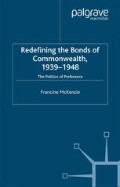Abstract
In the eighteenth and nineteenth centuries, tariff policy had been a fundamental and controversial aspect of imperial governance. Colonial outposts contested British authority to impose tariffs on goods entering their markets. Tension exploded into full-blown conflict during the American War of Independence, when control over tariffs was equated with political independence. In 1778 the British government repudiated its right to impose tariffs on commodities entering the Thirteen Colonies. The concession came too late, but London learned not to disregard the commercial interests of the remaining colonies if it wanted peace in the Empire. When the Peel government introduced free trade in 1846 Britain ceded irrevocably the responsibility for tariffs to the colonies of settlement. As D. K. Fieldhouse explains, Britain benefited by dispensing with some of its imperial prerogatives because the colonies remained within the imperial orbit.3 Control over tariff policy was one of the earliest powers of local administrations.
Tariff personality was an essential element of self-government.
It was a mark of constitutional status, a symbol of autonomy.
(W. K. Hancock)
The issue between Free Trade, on the one side, and Protection and Preference, on the other, was not a mere detail of trade policy. It was essentially a conflict between two wholly different philosophies of national life.
(L. S. Amery)
Access this chapter
Tax calculation will be finalised at checkout
Purchases are for personal use only
Preview
Unable to display preview. Download preview PDF.
Author information
Authors and Affiliations
Copyright information
© 2002 Francine McKenzie
About this chapter
Cite this chapter
McKenzie, F. (2002). A Short History of Imperial Preference: the Myth of Commonwealth Unity and the Reality of National Interests. In: Redefining the Bonds of Commonwealth, 1939-1948. Cambridge Imperial and Post-Colonial Studies Series. Palgrave Macmillan, London. https://doi.org/10.1057/9780230554689_2
Download citation
DOI: https://doi.org/10.1057/9780230554689_2
Publisher Name: Palgrave Macmillan, London
Print ISBN: 978-1-349-43021-5
Online ISBN: 978-0-230-55468-9
eBook Packages: Palgrave History CollectionHistory (R0)

